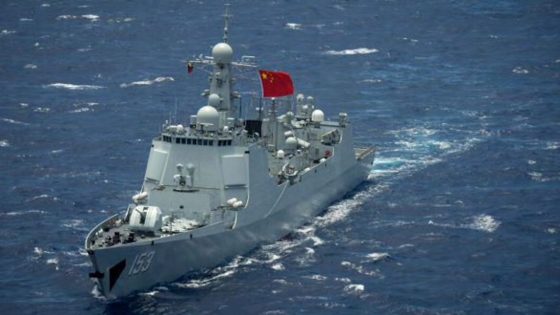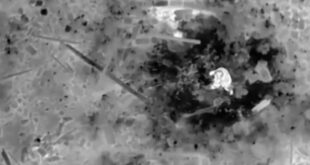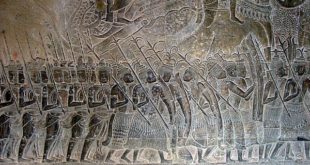China ship

US, Greece Enhance Ties with China, Turkey in the Background
October 14, 2021 11:32 PM
- Natalie Liu VOA
he United States and Greece upgraded an existing Mutual Defense Cooperation Agreement on Thursday, a move seen as elevating bilateral ties in defense and overall relations.
The amendment to the MDCA was signed by U.S. Secretary of State Antony Blinken and visiting Greek Foreign Minister Nikos Dendias in Washington as part of the third round of the U.S.-Greece Strategic Dialogue. The talks were launched in 2018 by then-U.S. Secretary of State Mike Pompeo and his Greek counterpart.
Blinken described the dialogue as “a signal of our shared commitment to deepen our partnership” through which the two countries will become “an even more powerful force for peace, prosperity and human dignity.”
The amendment will enable U.S. forces in Greece “to train and operate from additional locations,” Blinken told a Thursday news conference.
Dendias described the amendment as one that safeguards Greek interests and enables collaboration beyond defense issues.
“It also creates a shell [framework] that allows the United States to invest in Greece, not only for the improvement of our country’s defense facilities, but to do so in a broader framework of cooperation that is being established and improved,” he said.
The agreement comes as tension appears to be rising in the eastern Mediterranean, where Greece and its neighbor Turkey have recently accused each other of aggressive actions that threaten an escalation of territorial disputes.
Reliable ally
Congressman Ted Deutch, a senior member of the House of Representatives Foreign Affairs Committee, also met with Dendias this week. In written response to VOA’s request for comment, Deutch, chairman of the Middle East, North Africa, and Global Counterterrorism Subcommittee, said Greece is a reliable ally in the eastern Mediterranean region.
“The U.S.-Greece relationship is vital to U.S. national interests and to the security and stability of the Eastern Mediterranean region. Greece has consistently proven itself to be a reliable ally in the region, and the United States must continue to support its efforts to modernize its armed forces and strengthen our nations’ strategic partnership,” Deutch said.
Deutch said the importance of this partnership is behind his decision to sponsor, with Representative Gus Bilirakis, the United States-Greece Defense and Interparliamentary Partnership Act of 2021.
The bill, he said, is designed to foster interparliamentary engagement among Greece, Cyprus and Israel, known as the “3+1 process,” in addition to supporting Greece’s military modernization.
“Encouraging continued security cooperation among our allies and partners, including Greece, will help us ensure stability throughout the region and bolster global security,” Deutch told VOA in a written statement.
Stephen J. Blank, a senior fellow in the Eurasia Program at the Foreign Policy Research Institute, told VOA in a phone interview that while the strengthening of defense ties with Athens sends a signal that the U.S. will support Greece, Washington’s overriding concern is ensuring that the “two NATO allies that have a long history of mutual enmity dating back to Greek independence from the Ottoman Empire in 1821, don’t start a war.”
China
China’s influence in Greece, particularly its purchase of a majority stake in the largest and strategically located port in Greece, the Port of Piraeus, is another factor in the background of talks between Washington and Athens.
China Ocean Shipping Company purchased a 51% stake in the Piraeus Port Authority in 2016 and signed a deal to obtain an additional 16% stake last month, despite having delivered only a third of agreed-to investments under the initial agreement.
Eric Brown, who studies China’s strategic designs at the Hudson Institute in Washington, told VOA that the Port of Piraeus “has featured prominently in the [People’s Republic of China’s] imagining of the new world system that it is striving to build,” as a key component to China’s maritime Silk Road Initiative.
Even though Beijing’s control of a key Greek and European strategic asset may put a question mark in the minds of policymakers in Washington and Brussels, the fact that China is situated in a different part of the world limits its potential as a guarantor of security for countries like Greece, Brown said.
“Geography matters,” he said.
Chinese ownership of a key port at the crossroads of Europe, Asia and Africa nonetheless poses significant security concerns, U.S. analysts say.
“They own it now, they can use for economic, military, intelligence purposes, whatever they want,” Blank said.
David Stilwell, a former Pentagon and State Department official who served as U.S. assistant secretary of state for East Asia and the Pacific, said deals Beijing has managed to strike may not always last, pointing to recent reports that the 99-year lease between a Chinese state-backed entity and the Australian Port of Darwin may either be scrapped or subjected to additional scrutiny on security grounds.
In Stilwell’s view, the more distance democratic countries put between themselves and Beijing, the better. He considers Lithuania’s recent decision to withdraw from a multilateral forum designed to increase collaboration between China and Central and Eastern European countries as a model that other countries can learn from.
 Soldier of Fortune Magazine The Journal of Professional Adventurers
Soldier of Fortune Magazine The Journal of Professional Adventurers






